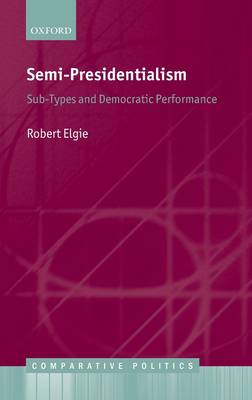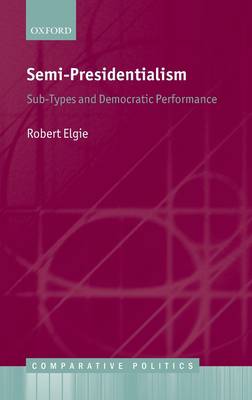
En raison d'une grêve chez bpost, votre commande pourrait être retardée. Vous avez besoin d’un livre rapidement ? Nos magasins vous accueillent à bras ouverts !
- Retrait gratuit dans votre magasin Club
- 7.000.000 titres dans notre catalogue
- Payer en toute sécurité
- Toujours un magasin près de chez vous
En raison de la grêve chez bpost, votre commande pourrait être retardée. Vous avez besoin d’un livre rapidement ? Nos magasins vous accueillent à bras ouverts !
- Retrait gratuit dans votre magasin Club
- 7.000.0000 titres dans notre catalogue
- Payer en toute sécurité
- Toujours un magasin près de chez vous
Description
In this book, Robert Elgie examines the relationship between semi-presidentialism and democratic performance. Semi-presidentialism--where a constitution provides for both a directly elected president and a prime minister and cabinet responsible to the legislature--has become the regime type of choice for new democracies. There are now over 50 countries in the world with a semi-presidential constitution and the vast majority of these countries have chosen this form of government since the early 1990s. Semi-Presidentialism operationalizes Shugart and Carey's distinction between president-parliamentarism--where the prime minister is responsible to both the legislature and to the directly elected president--and premier-presidentialism--where the prime minister is responsible to the legislature alone. The book shows that, all else equal, the president-parliamentary sub-type is more likely to be associated with a poorer democratic performance than its premier-presidential counterpart. The evidence is based on a mixed-method approach, including large-n comparative statistical studies of all semi-presidential democracies since 1919, as well as in-depth case studies. Comparative Politics is a series for students, teachers, and researchers of political science that deals with contemporary government and politics. Global in scope, books in the series are characterised by a stress on comparative analysis and strong methodological rigour. The series is published in association with the European Consortium for Political Research.
Spécifications
Parties prenantes
- Auteur(s) :
- Editeur:
Contenu
- Nombre de pages :
- 218
- Langue:
- Anglais
- Collection :
Caractéristiques
- EAN:
- 9780199585984
- Date de parution :
- 15-10-11
- Format:
- Livre relié
- Format numérique:
- Genaaid
- Dimensions :
- 160 mm x 234 mm
- Poids :
- 476 g

Les avis
Nous publions uniquement les avis qui respectent les conditions requises. Consultez nos conditions pour les avis.






